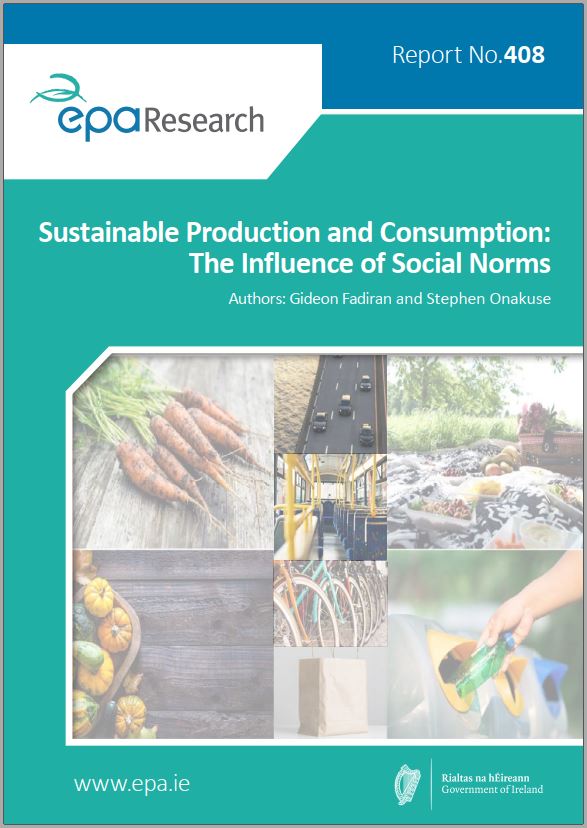Research 408: Sustainable Production and Consumption: The Influence of Social Norms
Authors: Gideon Fadiran and Stephen Onakuse
Summary: Consumer behaviour represents acts or decisions that influence the direction of production and consumption activities, which are, in turn, driven by household and, ultimately, economic activities. This research investigated the linkages between habits and norms that drive behavioural attitudes and preferences, and how consumers’ socio-economic background, community, beliefs, etc. are identified as the driving factors of consumer behaviour and waste patterns.

Project Highlights
Watch the project highlights video
Consumer behaviour represents acts or decisions that influence the direction of production and consumption activities, which are, in turn, driven by household and, ultimately, economic activities. Households’ production and consumption behaviours have an impact on the level of waste generated, which can be defined as sustainable or unsustainable. These decisions become habits and norms that drive behavioural attitudes and preferences, which are largely influenced by factors such as consumers’ socio-economic background, community, beliefs (opinion), knowledge (information gaps) and concern (e.g. concern for local businesses, farmers and the environment). This research investigated the linkages between habits and norms that drive behavioural attitudes and preferences, and how consumers’ socio-economic background, community, beliefs (opinion), etc. are identified as the driving factors of consumer behaviour and waste patterns.
Identifying Pressures
Ireland has drawn up national policies to achieve sustainable production and consumption (SPAC) levels through national framework plans from different governmental departments, including Sustainable Development Goal 12 (SDG12, on responsible production and consumption). Nonetheless, several indicators, such as organic farmland as a percentage of total farmland, household waste per capita and the SDG12 score, suggest a poor SPAC performance. Policy approaches aimed at improving the performances have been targeted at different sectors and stakeholders. This research is aligned with the global aim of attaining the SDG12, which includes reducing food and general waste and increasing awareness on sustainable development and lifestyles.
The findings from this research suggest that household decisions and waste disposal habits underpinned by more sustainable principles can contribute towards meeting national and global sustainability goals. The research also discusses a social policy intervention to (i) shift consumers towards more sustainable and social behaviour; (ii) increase households’ environmental knowledge and awareness in order to increase environmental concern; and (iii) bridge the environmental information gap by creating targeted awareness campaigns that educate consumers on the language and terminology associated with the environment, sustainability, labels, definitions and implications. The research developed a comprehensive consumer environmental knowledge, understanding and awareness toolbox at the county level.
Informing Policy
There are different approaches to influencing consumption decisions and patterns. This report’s findings indicate that it is important to increase consumers’ awareness and understanding of sustainability, eco-labels and the differences between organic and non-organic labels and, more importantly, to increase consumers’ willingness to pay for more environmentally friendly products. Changing consumer perceptions in these areas leads to change in consumers’ purchase decisions and can thereby influence the direction of production activities. Consumers’ level of environmental awareness and understanding influences how they shop and consume, which in aggregate influences the direction of demand and supply, as consumers’ decisions are influenced by their level of environmental knowledge and concern. Identifying gaps in consumers’ knowledge, attitude and behaviour would support policy development targeting SDG12.
Developing Solutions
This research sought to identify target areas to focus on in order to influence and stimulate sustainable production and consumption decisions and behaviour that could help Ireland meet national goals in this area. This project, through a survey of case studies, identified environmental barriers to planning, consumption and waste behaviour among consumers. Four external factors were identified as driving factors for sustainable consumption and waste behaviour, namely (i) environmental concern, (ii) environmental knowledge, (iii) opinion/belief and (iv) concern for local businesses. Potential groups or clusters for policy targets were also identified; for example, the survey indicated that men (from gender linkage) are less likely to consume food sustainably. People living in rented accommodation, either shared or alone, were identified as another group that can be targeted to activate more sustainable consumption behaviours. The project initiated the development of a model framework aimed at achieving a behavioural representation of consumer decisions that can deal with the data limitations that often plague empirical analysis.
https://www.epa.ie/media/epa-2020/research/epa-funded-research/Report-cover-408.jpg